美国合同法案例Wood v. Lucy, Lady Duff-Gordon
英美合同法不当得利相关案例
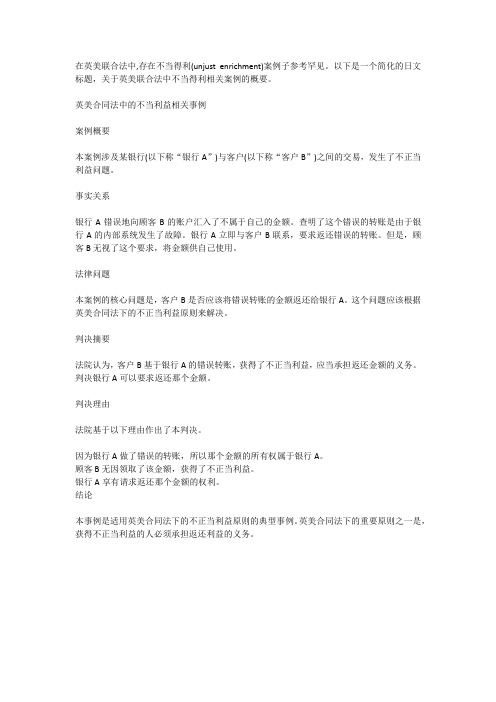
在英美联合法中,存在不当得利(unjust enrichment)案例子参考罕见。
以下是一个简化的日文标题,关于英美联合法中不当得利相关案例的概要。
英美合同法中的不当利益相关事例
案例概要
本案例涉及某银行(以下称“银行A”)与客户(以下称“客户B”)之间的交易,发生了不正当利益问题。
事实关系
银行A错误地向顾客B的账户汇入了不属于自己的金额。
查明了这个错误的转账是由于银行A的内部系统发生了故障。
银行A立即与客户B联系,要求返还错误的转账。
但是,顾客B无视了这个要求,将金额供自己使用。
法律问题
本案例的核心问题是,客户B是否应该将错误转账的金额返还给银行A。
这个问题应该根据英美合同法下的不正当利益原则来解决。
判决摘要
法院认为,客户B基于银行A的错误转账,获得了不正当利益,应当承担返还金额的义务。
判决银行A可以要求返还那个金额。
判决理由
法院基于以下理由作出了本判决。
因为银行A做了错误的转账,所以那个金额的所有权属于银行A。
顾客B无因领取了该金额,获得了不正当利益。
银行A享有请求返还那个金额的权利。
结论
本事例是适用英美合同法下的不正当利益原则的典型事例。
英美合同法下的重要原则之一是,获得不正当利益的人必须承担返还利益的义务。
美国合同法案例Wood v. Lucy, Lady Duff-Gordon
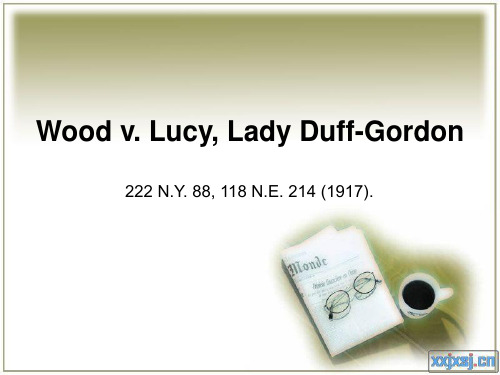
Facts
• The trial court denied Lady DuffGordon’s motion for a judgment on the pleadings and found for Wood. • The intermediate appellate court reversed the trial court’s judgement on the grounds that the contract lacked mutuality because Wood never expressly promised to do anything. • Wood then appealed to the Court of Appeals of New York.
Facts
• The plaintiff insisted that the defendant placed endorsements on clothes without his knowledge and in violation of the contract.
Facts
• The defendant defended on the grounds that no valid contract existed and therefore since the P had not made an express promise to do anything, the D contended that the agreement was invalid and could not be enforced for lack of consideration.
The implication of such a promise can find supports in many circumstances.
英美合同法经典案例
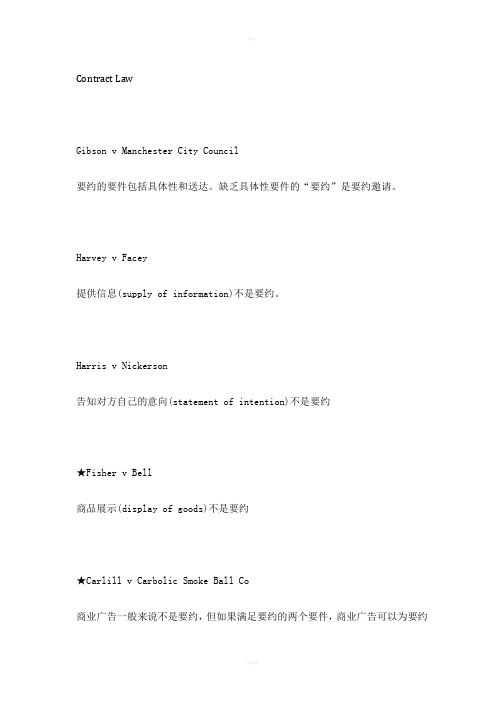
Contract LawGibson v Manchester City Council要约的要件包括具体性和送达。
缺乏具体性要件的“要约”是要约邀请。
Harvey v Facey提供信息(supply of information)不是要约。
Harris v Nickerson告知对方自己的意向(statement of intention)不是要约★Fisher v Bell商品展示(display of goods)不是要约★Carlill v Carbolic Smoke Ball Co商业广告一般来说不是要约,但如果满足要约的两个要件,商业广告可以为要约★Hyde v Wrench反要约等于对于要约的拒绝。
★Felthouse v Bindley沉默不可以作为承诺。
此为基本原则,F4不考例外。
★Adams v Lindsell投邮规则。
原则上,在满足其他判例法所设定的条件,如果承诺是以邮件方式通知要约人的,承诺信件一旦交邮,即视送达,合同也随之成立。
★Re McArdle过去的行为作为对价是不充足的。
★White v Bluett对价必须有在法律上认可的价值。
Colins v Godefroy履行法定义务的行为不可以作为对价。
Glasbrook Bros v Glamorgan CC如果当事人的行为超出了法定义务的范畴,那么超出的部分可以成为充足的对价。
Stilk v Myrick履行约定义务的行为不可以作为对价。
Hartley v Ponsonby如果当事人的行为超出了约定义务的范畴,那么超出的部分可以成为充足的对价。
Shadwell v Shadwell履行约定义务的行为可以用来支持来自第三方的对价。
★Williams v Roffey Bros履行约定义务的行为如果可以给对方带来新的实质性的利益,那么该行为可以支持来自对方的对价。
★Pinnel’s Case债务的部分履行不可以解除债务的全部。
英美合同法十大经典案例

英美合同法十大经典案例一、帕拉丁诉简案(Paradine v. Jane)1. 故事大概。
这事儿发生在很久以前。
帕拉丁把一块地租给了简。
然后呢,战争爆发了,敌人入侵,简被赶出了那块地,根本没法使用。
帕拉丁可不管这些,还是要求简交租金。
2. 合同法点。
这个案子就确立了一个重要原则,叫做绝对合同责任。
啥意思呢?就是在没有特殊约定的情况下,合同一方不能因为意外事件或者不可抗力就免除自己的合同义务。
就像简,虽然是因为战争这种不可抗力被赶出地了,但按照当时的判决,还是得交租金。
这就好像你和别人签了个租房子的合同,哪怕房子突然被外星人占了(当然这是夸张啦),按照这个原则,你可能还是得交房租呢。
二、哈德利诉巴克森戴尔案(Hadley v. Baxendale)1. 故事大概。
哈德利的磨坊有个曲轴坏了,他就把曲轴交给了承运人巴克森戴尔,让他运到工厂去修理。
巴克森戴尔没按时送到,结果哈德利的磨坊因为没有曲轴就停工了,损失了不少钱。
哈德利就要求巴克森戴尔赔偿他的全部损失,包括因为停工而损失的利润。
2. 合同法点。
这个案子弄出了一个很有名的规则,就是关于违约损害赔偿的可预见规则。
简单说呢,违约方只需要赔偿在订立合同时可以合理预见的损失。
像在这个案子里,承运人不知道曲轴对磨坊这么重要,他只知道是运个东西,所以不用赔偿那些因为磨坊停工而损失的利润。
就好比你让快递员送个包裹,你没告诉他包裹里是救命的药,结果快递晚到了,药没及时用病人出问题了,按照这个规则,快递员可能不用赔病人出问题的损失,因为他不知道这包裹这么重要。
三、拉弗尔斯诉维切豪斯案(Raffles v. Wichelhaus)1. 故事大概。
这俩人签订了一个棉花买卖合同,合同里提到要买卖一艘叫“无敌号”(Peerless)的船上的棉花。
结果呢,有两艘船都叫“无敌号”,而且他们俩想的不是同一艘船。
拉弗尔斯觉得是一艘10月份到港的“无敌号”,维切豪斯觉得是12月份到港的“无敌号”。
美国合同法 第4章 合同的效力4-8(显失公平)

(3)如果程序性显失公平达到了不正确说明、胁迫或不正当影响的程度, 那么即使不考虑实质性显失公平,合同也是可以撤销的。
• 显失公平的后果 从原则上说,显失公平的合同是可撤销的合同。 当法院拒绝强制执行整个合同时,恢复原状就应当成为
[判决意见]
纽约州最高法院在终审判决中说:“问题在于,在本案 中,把一台零售价为300美元的制冷设备按900美元出售 (其中包括了信贷费和18美元的销售税),作为一个法律问 题,是不是显失公平的。本法院认为,答案是肯定的。可以 肯定,300美已经包括了合理的利润;900美元一听就知道 很贵。这两个数字之差真是大得不能再大了。信贷费一项就 比零售价高出了100美元以上。这笔费用本身就足以支持本 法院作出显失公平的判决。”
2. 程序性显失公平
(1)一方由于不能归咎于他自己的原因未能理解 合同的内容;
(2)一方由于其所处的地位完全没有同对方讨价 还价的余地
[例]
被告将一个加油站出租给原告经营,在租赁合同中 的一个条款规定:该承租人将免除该出租人所有的发生 于该出租财产的过失责任。某日,被告公司的雇员把汽 油喷到了原告及其助手的身上致烧伤。被告请求依据该 免责条款解除自己对原告的赔偿责任。
案例2
雷姆科企业公司诉豪斯顿案 堪萨斯州上诉法院(1984年) [案由]
1980年9月13日,原告雷姆科企业公司与被告豪斯顿签订了一 个附带购买选择权的租赁协议。租赁的对象是一台带落地支架的彩 色电视机。该协议规定,如果被告能每周付17美元,连续付款104 周,她就可以拥有这台电视机。该协议还规定,被告可以在任何时 候退回该租赁的财产,从而取消这个协议。1982年1月23日,当继 续付款36周即可拥有这台电视机的时候,被告停止了付款,也没有 退回该电视机。于是,原告于1982年2月1日向法院起诉,要求被 告返还电视机,并支付尚未支付的租金。被告在法院声称,该租赁 协议是实质性显失公平的,因为购该电视机的价格(1768美元) 为该电视机的批发价(500美元)的3.5倍以上。
合同法经典案例分析
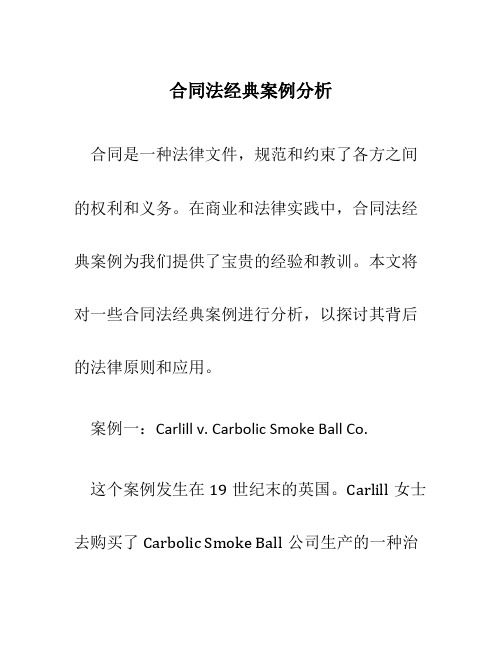
合同法经典案例分析合同是一种法律文件,规范和约束了各方之间的权利和义务。
在商业和法律实践中,合同法经典案例为我们提供了宝贵的经验和教训。
本文将对一些合同法经典案例进行分析,以探讨其背后的法律原则和应用。
案例一:Carlill v. Carbolic Smoke Ball Co.这个案例发生在19世纪末的英国。
Carlill女士去购买了Carbolic Smoke Ball公司生产的一种治疗流感的烟球,并按照说明书使用了该产品,但仍然感染了流感。
Carbolic Smoke Ball公司的广告声称,如果按照说明书使用该产品,购买者将获得奖励100英镑。
然而,公司拒绝支付奖金,理由是广告是媒体宣传而非法律约束。
法院判决称,该广告向公众做出了明确的承诺,并且支付奖金的条件都已经满足,因此Carlill女士有权要求公司履行承诺。
此案在合同法中奠定了以广告为基础的合同的有效性原则。
案例二:Donoghue v. Stevenson这个案例是英国法律历史上的一次重要判例。
1932年,Mrs. Donoghue在一家餐馆里喝了一瓶饮料,发现里面有一只已经腐烂的死老鼠。
她因此患上了伤寒病,提起诉讼要求饮料生产商Stevenson公司赔偿。
法院判决称,虽然Mrs. Donoghue与Stevenson公司之间没有直接的合同关系,但该产品的缺陷导致了Mrs. Donoghue的伤害。
该案确认了制造商对消费者负有产品责任的原则,这对当前的产品责任法有着重要的影响。
案例三:Wood v. Lucy, Lady Duff-Gordon这个案例发生在20世纪初的美国。
Lady Duff-Gordon是一位著名的时装设计师,她与Wood签订了一份合同,让他独家代理她的设计。
然而,当Wood同时与一家报纸签署了广告合同时,Lady Duff-Gordon声称这违反了他们之间的独家代理关系。
法院判决认为,合同只有给予各方明确的权利和义务,才能被视为有效。
美国合同法 第4章 合同的效力4-5(不正确说明)

案例1
奥布德诉施莱麦尔
华盛顿州最高法院(1960年)
[案由]
原 告 弗 来 德 ·奥 布 德 夫 妇 从 被 告 罗 伯 特 ·施 莱 麦 尔 夫 妇 购 得 一 栋 公 寓 房 屋,而被告没有告知房屋受白蚁侵扰的事实。原告在购买房屋后,发现 该房屋受白蚁侵扰的现象十分严重,并得知被告最初发现其房屋受白蚁 侵害时,曾聘请了一位叫萨斯克的虫灾控制专家。萨斯克为清除白蚁采 取了一些措施,并对房屋作了些修缮。此后,从房屋表面上看受白蚁侵 害的情况就不是很明显了。原告起诉被告欺诈性地隐瞒了房屋受白蚁侵 扰的事实,要求获得损害赔偿。被告辩称,他们没有义务告知原告有关 白蚁侵害房屋的情况,因原告从来没有问过他们房屋是否有白蚁。一审 法院判原告胜诉,要求被告赔偿金额为3950美元的损害赔偿。被实通常涉及到交易 的标的物的性质,如所出售的货物的质量。同时, 对合同内容或其法律后果的陈述也可以构成不正确 说明。
从方式上看,不正确说明可以由口头、书面和行为
例:一台机器的卖方对买方说: (1)这台机器过去一直运转得很好。 (2)这台机器目前运转正常。 (3)这台机器会运转得很不错。 (4)这台机器在投入使用之后其运转将达到某一特定水平。
[简要评论]
该案涉及“买者自慎之”原则。它反映了在商品交易中,处于平 等交易地位的双方都有义务自己去获取信息。该原则是个人主主义在 商业活动中的反映。然而从实证的角度考虑,在交易中的买方没有询 问相关信息的情况下,假若法律要求卖方有义务主动披露过多的相关 信息,便会不恰当地增加卖方的交易成本,而鼓励买方“懒惰”。因 此,一个更为恰当的法律规则是鼓励买方自己去寻求与交易有关的信 息。
(2)不正确说明可以由“隐瞒” (concealment)构成
隐瞒既可以是一种积极的掩盖真相的行为,也可以 是一种消极的不披露有义务披露的事实的行为。
美国合同法案例
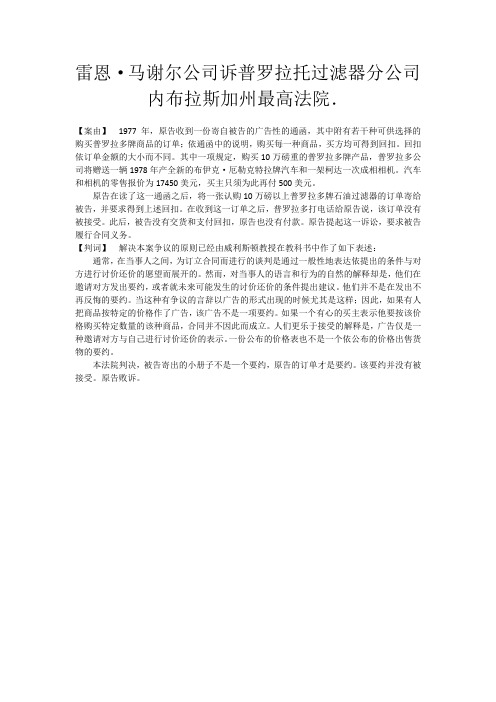
雷恩·马谢尔公司诉普罗拉托过滤器分公司内布拉斯加州最高法院.【案由】1977年,原告收到一份寄自被告的广告性的通函,其中附有若干种可供选择的购买普罗拉多牌商品的订单;依通函中的说明,购买每一种商品,买方均可得到回扣。
回扣依订单金额的大小而不同。
其中一项规定,购买10万磅重的普罗拉多牌产品,普罗拉多公司将赠送一辆1978年产全新的布伊克·厄勒克特拉牌汽车和一架柯达一次成相相机。
汽车和相机的零售报价为17450美元,买主只须为此再付500美元。
原告在读了这一通函之后,将一张认购10万磅以上普罗拉多牌石油过滤器的订单寄给被告,并要求得到上述回扣。
在收到这一订单之后,普罗拉多打电话给原告说,该订单没有被接受。
此后,被告没有交货和支付回扣,原告也没有付款。
原告提起这一诉讼,要求被告履行合同义务。
【判词】解决本案争议的原则已经由威利斯顿教授在教科书中作了如下表述:通常,在当事人之间,为订立合同而进行的谈判是通过一般性地表达依提出的条件与对方进行讨价还价的愿望而展开的。
然而,对当事人的语言和行为的自然的解释却是,他们在邀请对方发出要约,或者就未来可能发生的讨价还价的条件提出建议。
他们并不是在发出不再反悔的要约。
当这种有争议的言辞以广告的形式出现的时候尤其是这样;因此,如果有人把商品按特定的价格作了广告,该广告不是一项要约。
如果一个有心的买主表示他要按该价格购买特定数量的该种商品,合同并不因此而成立。
人们更乐于接受的解释是,广告仅是一种邀请对方与自己进行讨价还价的表示。
一份公布的价格表也不是一个依公布的价格出售货物的要约。
本法院判决,被告寄出的小册子不是—个要约,原告的订单才是要约。
该要约并没有被接受。
原告败诉。
英美合同法不当得利相关案例
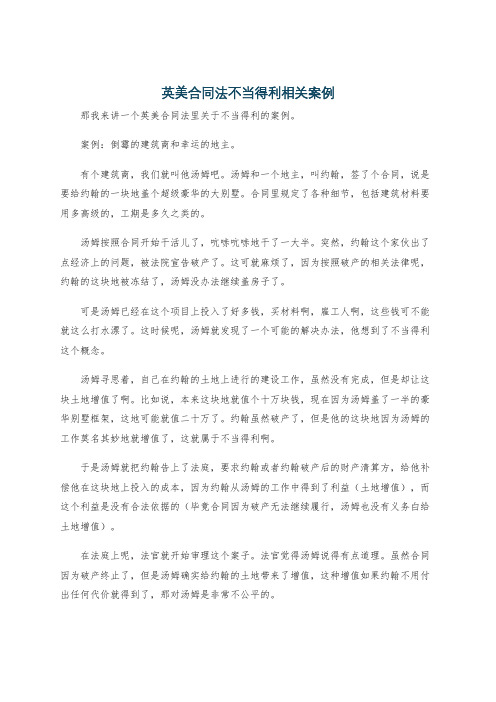
英美合同法不当得利相关案例那我来讲一个英美合同法里关于不当得利的案例。
案例:倒霉的建筑商和幸运的地主。
有个建筑商,我们就叫他汤姆吧。
汤姆和一个地主,叫约翰,签了个合同,说是要给约翰的一块地盖个超级豪华的大别墅。
合同里规定了各种细节,包括建筑材料要用多高级的,工期是多久之类的。
汤姆按照合同开始干活儿了,吭哧吭哧地干了一大半。
突然,约翰这个家伙出了点经济上的问题,被法院宣告破产了。
这可就麻烦了,因为按照破产的相关法律呢,约翰的这块地被冻结了,汤姆没办法继续盖房子了。
可是汤姆已经在这个项目上投入了好多钱,买材料啊,雇工人啊,这些钱可不能就这么打水漂了。
这时候呢,汤姆就发现了一个可能的解决办法,他想到了不当得利这个概念。
汤姆寻思着,自己在约翰的土地上进行的建设工作,虽然没有完成,但是却让这块土地增值了啊。
比如说,本来这块地就值个十万块钱,现在因为汤姆盖了一半的豪华别墅框架,这地可能就值二十万了。
约翰虽然破产了,但是他的这块地因为汤姆的工作莫名其妙地就增值了,这就属于不当得利啊。
于是汤姆就把约翰告上了法庭,要求约翰或者约翰破产后的财产清算方,给他补偿他在这块地上投入的成本,因为约翰从汤姆的工作中得到了利益(土地增值),而这个利益是没有合法依据的(毕竟合同因为破产无法继续履行,汤姆也没有义务白给土地增值)。
在法庭上呢,法官就开始审理这个案子。
法官觉得汤姆说得有点道理。
虽然合同因为破产终止了,但是汤姆确实给约翰的土地带来了增值,这种增值如果约翰不用付出任何代价就得到了,那对汤姆是非常不公平的。
最后呢,法官判决约翰的财产清算方要给汤姆补偿一部分他在土地上投入的成本,当然不是全部,因为汤姆的工作没有全部完成,要根据土地增值的比例以及汤姆投入的合理性来确定补偿的金额。
这个案例就很好地体现了英美合同法里不当得利的概念。
就是说,一方不能没有合法依据地从另一方的行为或者付出中获得利益,如果获得了,那另一方就有权利要求补偿,来恢复一种公平的状态。
著名的美国合同法案例
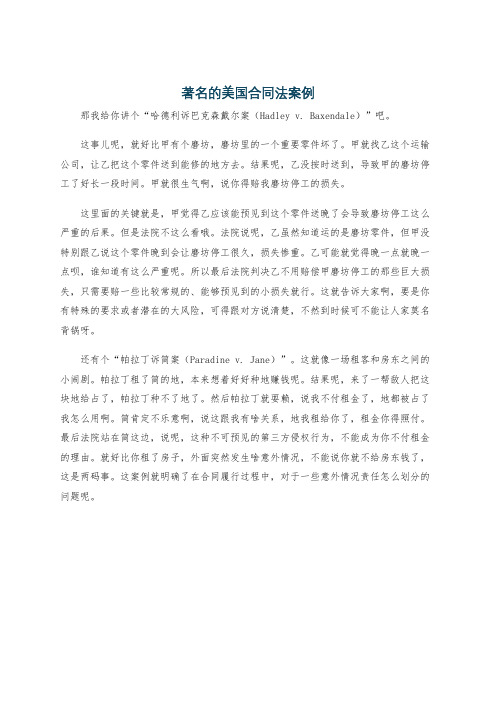
著名的美国合同法案例
那我给你讲个“哈德利诉巴克森戴尔案(Hadley v. Baxendale)”吧。
这事儿呢,就好比甲有个磨坊,磨坊里的一个重要零件坏了。
甲就找乙这个运输公司,让乙把这个零件送到能修的地方去。
结果呢,乙没按时送到,导致甲的磨坊停工了好长一段时间。
甲就很生气啊,说你得赔我磨坊停工的损失。
这里面的关键就是,甲觉得乙应该能预见到这个零件送晚了会导致磨坊停工这么严重的后果。
但是法院不这么看哦。
法院说呢,乙虽然知道运的是磨坊零件,但甲没特别跟乙说这个零件晚到会让磨坊停工很久,损失惨重。
乙可能就觉得晚一点就晚一点呗,谁知道有这么严重呢。
所以最后法院判决乙不用赔偿甲磨坊停工的那些巨大损失,只需要赔一些比较常规的、能够预见到的小损失就行。
这就告诉大家啊,要是你有特殊的要求或者潜在的大风险,可得跟对方说清楚,不然到时候可不能让人家莫名背锅呀。
还有个“帕拉丁诉简案(Paradine v. Jane)”。
这就像一场租客和房东之间的小闹剧。
帕拉丁租了简的地,本来想着好好种地赚钱呢。
结果呢,来了一帮敌人把这块地给占了,帕拉丁种不了地了。
然后帕拉丁就耍赖,说我不付租金了,地都被占了我怎么用啊。
简肯定不乐意啊,说这跟我有啥关系,地我租给你了,租金你得照付。
最后法院站在简这边,说呢,这种不可预见的第三方侵权行为,不能成为你不付租金的理由。
就好比你租了房子,外面突然发生啥意外情况,不能说你就不给房东钱了,这是两码事。
这案例就明确了在合同履行过程中,对于一些意外情况责任怎么划分的问题呢。
美国合同法经典案例
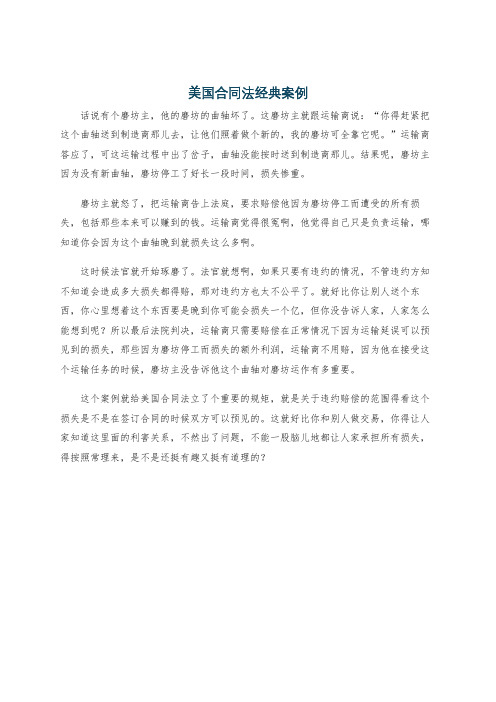
美国合同法经典案例
话说有个磨坊主,他的磨坊的曲轴坏了。
这磨坊主就跟运输商说:“你得赶紧把这个曲轴送到制造商那儿去,让他们照着做个新的,我的磨坊可全靠它呢。
”运输商答应了,可这运输过程中出了岔子,曲轴没能按时送到制造商那儿。
结果呢,磨坊主因为没有新曲轴,磨坊停工了好长一段时间,损失惨重。
磨坊主就怒了,把运输商告上法庭,要求赔偿他因为磨坊停工而遭受的所有损失,包括那些本来可以赚到的钱。
运输商觉得很冤啊,他觉得自己只是负责运输,哪知道你会因为这个曲轴晚到就损失这么多啊。
这时候法官就开始琢磨了。
法官就想啊,如果只要有违约的情况,不管违约方知不知道会造成多大损失都得赔,那对违约方也太不公平了。
就好比你让别人送个东西,你心里想着这个东西要是晚到你可能会损失一个亿,但你没告诉人家,人家怎么能想到呢?所以最后法院判决,运输商只需要赔偿在正常情况下因为运输延误可以预见到的损失,那些因为磨坊停工而损失的额外利润,运输商不用赔,因为他在接受这个运输任务的时候,磨坊主没告诉他这个曲轴对磨坊运作有多重要。
这个案例就给美国合同法立了个重要的规矩,就是关于违约赔偿的范围得看这个损失是不是在签订合同的时候双方可以预见的。
这就好比你和别人做交易,你得让人家知道这里面的利害关系,不然出了问题,不能一股脑儿地都让人家承担所有损失,得按照常理来,是不是还挺有趣又挺有道理的?。
美国合同法经典案例

美国合同法经典案例这事儿啊,就像这样。
有个磨坊主,他的磨坊里有个关键的轴断了。
这轴一断,磨坊就没法工作,那可就断了财路啊。
于是呢,他赶紧把这个轴交给一个运输商,让运输商把轴送到另一个地方去修好再送回来。
这运输商呢,就相当于和磨坊主有了个合同,就是把轴按时安全送到指定地点呗。
可这运输商不知道咋搞的,没有按时把轴送到。
结果呢,磨坊因为这个轴没按时回来,就停工了很长时间。
磨坊主就火大了啊,就把运输商告上法庭,说因为你没按时送轴,我这磨坊停工,损失了好多钱呢,你得赔我这些损失。
法庭就开始琢磨这个事儿了。
最后呢,法庭定了个规则,就是说啊,如果一方违约了,另一方要求赔偿的损失得是那种在订立合同的时候,双方都能合理预见到的损失。
在这个案子里,运输商不知道这个轴不按时送回会让磨坊停工这么久,他以为可能就是个普通的运输延误,所以磨坊主那些因为停工造成的特殊损失,运输商不用赔。
这个案例啊,就像给美国合同法定了个调调。
就是说,以后再遇到这种合同违约索赔的事儿,就得看看这个损失是不是在订立合同的时候双方能想到的。
要是那种很意外、很特殊的损失,违约方可能就不用承担了。
这就好比你去饭馆吃饭,饭馆答应给你上菜,结果晚了一会儿。
你要是因为这一会儿没吃上饭,耽误了和朋友看电影,这电影票钱饭馆可不用赔,因为饭馆在答应给你上菜的时候,可想不到还会有这么个事儿呢。
哈哈。
再给你讲个“佩奇诉弗来彻案(Piggie v. Fletcher)”。
佩奇和弗来彻之间有个合同,大概就是佩奇把一块地卖给弗来彻。
但是呢,这块地有点小秘密,佩奇知道这地下有个宝藏(夸张一下啦,可能是一些很有价值的东西)。
弗来彻买地的时候可不知道这事儿。
后来弗来彻发现了这个秘密,佩奇就眼红了,说这个宝藏应该还是我的,就打官司。
法庭最后判了,说在这个合同里啊,弗来彻买的是这块地的所有权,包括地上地下的东西,只要合同里没特别说这个宝藏除外。
所以啊,这就告诉我们,在订立合同的时候,一定要把各种可能的情况都考虑清楚,要不然就像佩奇这样,只能干瞪眼啦。
美国合同法案例期待利益
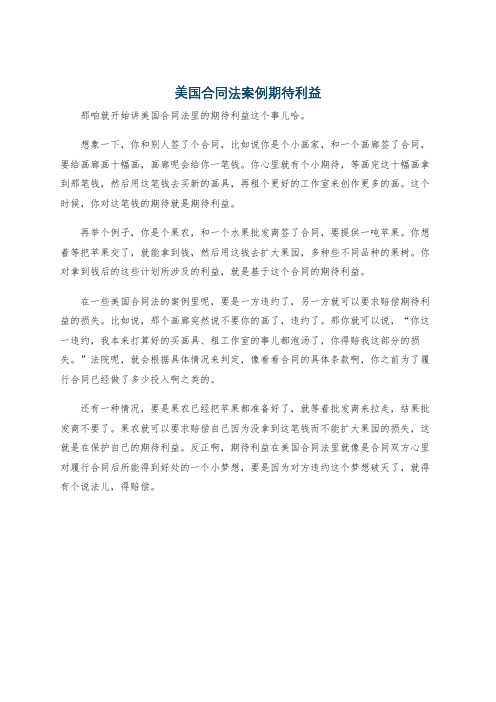
美国合同法案例期待利益
那咱就开始讲美国合同法里的期待利益这个事儿哈。
想象一下,你和别人签了个合同,比如说你是个小画家,和一个画廊签了合同,要给画廊画十幅画,画廊呢会给你一笔钱。
你心里就有个小期待,等画完这十幅画拿到那笔钱,然后用这笔钱去买新的画具,再租个更好的工作室来创作更多的画。
这个时候,你对这笔钱的期待就是期待利益。
再举个例子,你是个果农,和一个水果批发商签了合同,要提供一吨苹果。
你想着等把苹果交了,就能拿到钱,然后用这钱去扩大果园,多种些不同品种的果树。
你对拿到钱后的这些计划所涉及的利益,就是基于这个合同的期待利益。
在一些美国合同法的案例里呢,要是一方违约了,另一方就可以要求赔偿期待利益的损失。
比如说,那个画廊突然说不要你的画了,违约了。
那你就可以说,“你这一违约,我本来打算好的买画具、租工作室的事儿都泡汤了,你得赔我这部分的损失。
”法院呢,就会根据具体情况来判定,像看看合同的具体条款啊,你之前为了履行合同已经做了多少投入啊之类的。
还有一种情况,要是果农已经把苹果都准备好了,就等着批发商来拉走,结果批发商不要了。
果农就可以要求赔偿自己因为没拿到这笔钱而不能扩大果园的损失,这就是在保护自己的期待利益。
反正啊,期待利益在美国合同法里就像是合同双方心里对履行合同后所能得到好处的一个小梦想,要是因为对方违约这个梦想破灭了,就得有个说法儿,得赔偿。
国外合同法案例
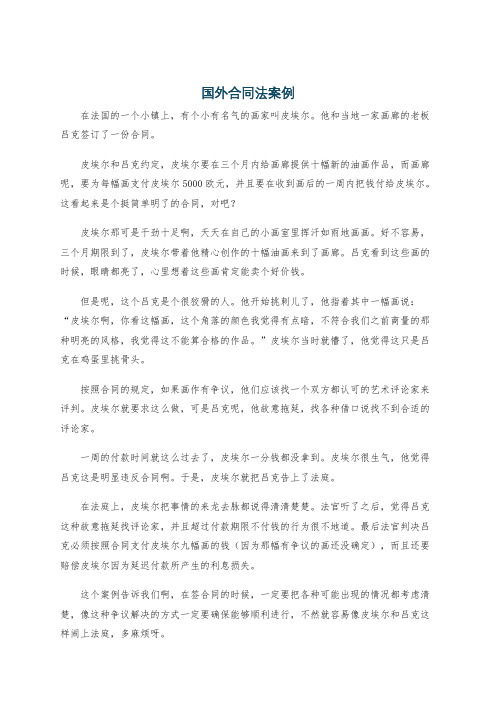
国外合同法案例在法国的一个小镇上,有个小有名气的画家叫皮埃尔。
他和当地一家画廊的老板吕克签订了一份合同。
皮埃尔和吕克约定,皮埃尔要在三个月内给画廊提供十幅新的油画作品,而画廊呢,要为每幅画支付皮埃尔5000欧元,并且要在收到画后的一周内把钱付给皮埃尔。
这看起来是个挺简单明了的合同,对吧?皮埃尔那可是干劲十足啊,天天在自己的小画室里挥汗如雨地画画。
好不容易,三个月期限到了,皮埃尔带着他精心创作的十幅油画来到了画廊。
吕克看到这些画的时候,眼睛都亮了,心里想着这些画肯定能卖个好价钱。
但是呢,这个吕克是个很狡猾的人。
他开始挑刺儿了,他指着其中一幅画说:“皮埃尔啊,你看这幅画,这个角落的颜色我觉得有点暗,不符合我们之前商量的那种明亮的风格,我觉得这不能算合格的作品。
”皮埃尔当时就懵了,他觉得这只是吕克在鸡蛋里挑骨头。
按照合同的规定,如果画作有争议,他们应该找一个双方都认可的艺术评论家来评判。
皮埃尔就要求这么做,可是吕克呢,他故意拖延,找各种借口说找不到合适的评论家。
一周的付款时间就这么过去了,皮埃尔一分钱都没拿到。
皮埃尔很生气,他觉得吕克这是明显违反合同啊。
于是,皮埃尔就把吕克告上了法庭。
在法庭上,皮埃尔把事情的来龙去脉都说得清清楚楚。
法官听了之后,觉得吕克这种故意拖延找评论家,并且超过付款期限不付钱的行为很不地道。
最后法官判决吕克必须按照合同支付皮埃尔九幅画的钱(因为那幅有争议的画还没确定),而且还要赔偿皮埃尔因为延迟付款所产生的利息损失。
这个案例告诉我们啊,在签合同的时候,一定要把各种可能出现的情况都考虑清楚,像这种争议解决的方式一定要确保能够顺利进行,不然就容易像皮埃尔和吕克这样闹上法庭,多麻烦呀。
在美国的洛杉矶,有个挺酷的摇滚乐队叫“闪电音符”。
他们和一家大型娱乐公司签订了一份演出合同。
娱乐公司计划在三个月后的一个盛大音乐节上让“闪电音符”作为开场乐队表演。
合同里规定,娱乐公司要给乐队提供最先进的音响设备,舞台布置也要按照乐队的要求来做,而且要给乐队支付10万美元的演出费。
外国人签订劳动合同的案例
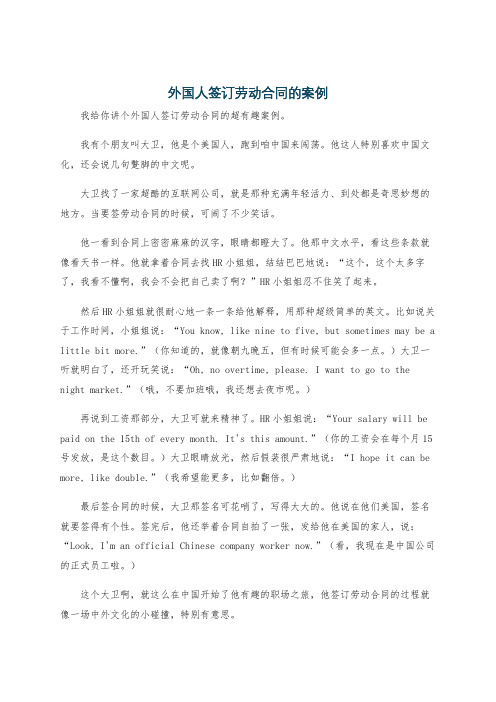
外国人签订劳动合同的案例我给你讲个外国人签订劳动合同的超有趣案例。
我有个朋友叫大卫,他是个美国人,跑到咱中国来闯荡。
他这人特别喜欢中国文化,还会说几句蹩脚的中文呢。
大卫找了一家超酷的互联网公司,就是那种充满年轻活力、到处都是奇思妙想的地方。
当要签劳动合同的时候,可闹了不少笑话。
他一看到合同上密密麻麻的汉字,眼睛都瞪大了。
他那中文水平,看这些条款就像看天书一样。
他就拿着合同去找HR小姐姐,结结巴巴地说:“这个,这个太多字了,我看不懂啊,我会不会把自己卖了啊?”HR小姐姐忍不住笑了起来。
然后HR小姐姐就很耐心地一条一条给他解释,用那种超级简单的英文。
比如说关于工作时间,小姐姐说:“You know, like nine to five, but sometimes may be a little bit more.”(你知道的,就像朝九晚五,但有时候可能会多一点。
)大卫一听就明白了,还开玩笑说:“Oh, no overtime, please. I want to go to the night market.”(哦,不要加班哦,我还想去夜市呢。
)再说到工资那部分,大卫可就来精神了。
HR小姐姐说:“Your salary will be paid on the 15th of every month. It's this amount.”(你的工资会在每个月15号发放,是这个数目。
)大卫眼睛放光,然后假装很严肃地说:“I hope it can be more, like double.”(我希望能更多,比如翻倍。
)最后签合同的时候,大卫那签名可花哨了,写得大大的。
他说在他们美国,签名就要签得有个性。
签完后,他还举着合同自拍了一张,发给他在美国的家人,说:“Look, I'm an official Chinese company worker now.”(看,我现在是中国公司的正式员工啦。
外国人签订劳动合同的案例
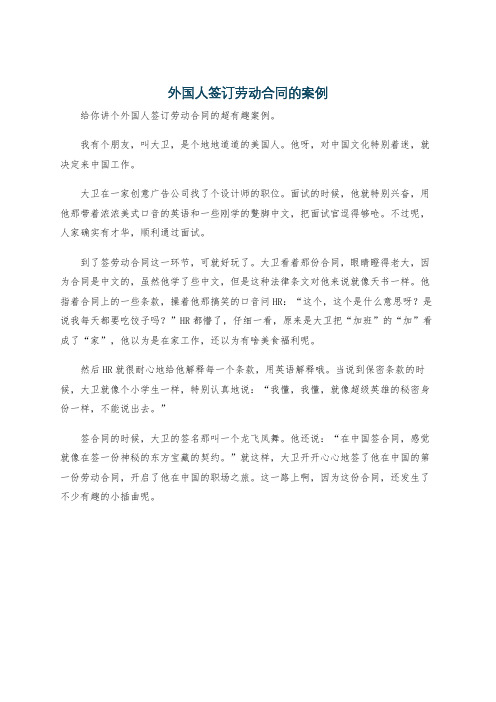
外国人签订劳动合同的案例
给你讲个外国人签订劳动合同的超有趣案例。
我有个朋友,叫大卫,是个地地道道的美国人。
他呀,对中国文化特别着迷,就决定来中国工作。
大卫在一家创意广告公司找了个设计师的职位。
面试的时候,他就特别兴奋,用他那带着浓浓美式口音的英语和一些刚学的蹩脚中文,把面试官逗得够呛。
不过呢,人家确实有才华,顺利通过面试。
到了签劳动合同这一环节,可就好玩了。
大卫看着那份合同,眼睛瞪得老大,因为合同是中文的,虽然他学了些中文,但是这种法律条文对他来说就像天书一样。
他指着合同上的一些条款,操着他那搞笑的口音问HR:“这个,这个是什么意思呀?是说我每天都要吃饺子吗?”HR都懵了,仔细一看,原来是大卫把“加班”的“加”看成了“家”,他以为是在家工作,还以为有啥美食福利呢。
然后HR就很耐心地给他解释每一个条款,用英语解释哦。
当说到保密条款的时候,大卫就像个小学生一样,特别认真地说:“我懂,我懂,就像超级英雄的秘密身份一样,不能说出去。
”
签合同的时候,大卫的签名那叫一个龙飞凤舞。
他还说:“在中国签合同,感觉就像在签一份神秘的东方宝藏的契约。
”就这样,大卫开开心心地签了他在中国的第一份劳动合同,开启了他在中国的职场之旅。
这一路上啊,因为这份合同,还发生了不少有趣的小插曲呢。
英美法系合同起草方式具体案例
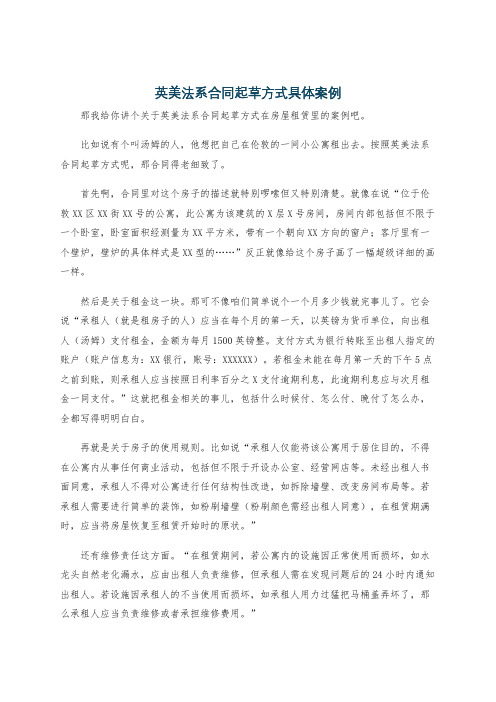
英美法系合同起草方式具体案例那我给你讲个关于英美法系合同起草方式在房屋租赁里的案例吧。
比如说有个叫汤姆的人,他想把自己在伦敦的一间小公寓租出去。
按照英美法系合同起草方式呢,那合同得老细致了。
首先啊,合同里对这个房子的描述就特别啰嗦但又特别清楚。
就像在说“位于伦敦XX区XX街XX号的公寓,此公寓为该建筑的X层X号房间,房间内部包括但不限于一个卧室,卧室面积经测量为XX平方米,带有一个朝向XX方向的窗户;客厅里有一个壁炉,壁炉的具体样式是XX型的……”反正就像给这个房子画了一幅超级详细的画一样。
然后是关于租金这一块。
那可不像咱们简单说个一个月多少钱就完事儿了。
它会说“承租人(就是租房子的人)应当在每个月的第一天,以英镑为货币单位,向出租人(汤姆)支付租金,金额为每月1500英镑整。
支付方式为银行转账至出租人指定的账户(账户信息为:XX银行,账号:XXXXXX)。
若租金未能在每月第一天的下午5点之前到账,则承租人应当按照日利率百分之X支付逾期利息,此逾期利息应与次月租金一同支付。
”这就把租金相关的事儿,包括什么时候付、怎么付、晚付了怎么办,全都写得明明白白。
再就是关于房子的使用规则。
比如说“承租人仅能将该公寓用于居住目的,不得在公寓内从事任何商业活动,包括但不限于开设办公室、经营网店等。
未经出租人书面同意,承租人不得对公寓进行任何结构性改造,如拆除墙壁、改变房间布局等。
若承租人需要进行简单的装饰,如粉刷墙壁(粉刷颜色需经出租人同意),在租赁期满时,应当将房屋恢复至租赁开始时的原状。
”还有维修责任这方面。
“在租赁期间,若公寓内的设施因正常使用而损坏,如水龙头自然老化漏水,应由出租人负责维修,但承租人需在发现问题后的24小时内通知出租人。
若设施因承租人的不当使用而损坏,如承租人用力过猛把马桶盖弄坏了,那么承租人应当负责维修或者承担维修费用。
”从这个房屋租赁的案例就能看出来,英美法系合同起草方式就是特别细致、全面,把能想到的各种情况,不管是现在可能发生的,还是未来有一丁点儿可能性会发生的,都写进合同里了,就像织一张密密麻麻的网,让双方的权利和义务都清清楚楚地被网在里面,谁也别想钻空子。
体现中美合同法差异的案例
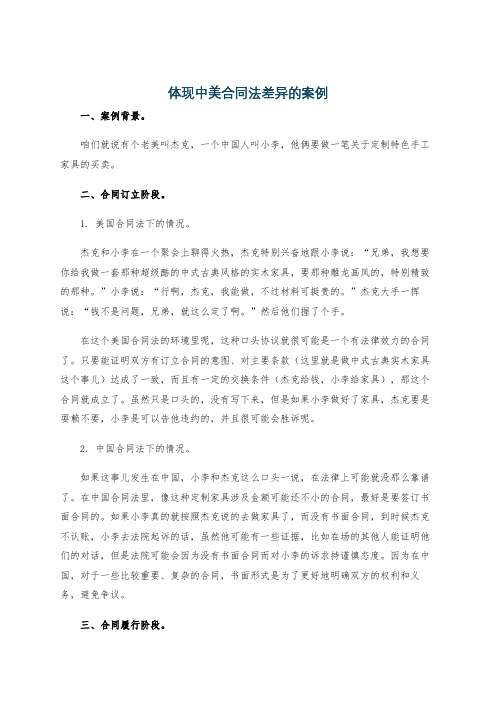
体现中美合同法差异的案例一、案例背景。
咱们就说有个老美叫杰克,一个中国人叫小李,他俩要做一笔关于定制特色手工家具的买卖。
二、合同订立阶段。
1. 美国合同法下的情况。
杰克和小李在一个聚会上聊得火热,杰克特别兴奋地跟小李说:“兄弟,我想要你给我做一套那种超级酷的中式古典风格的实木家具,要那种雕龙画凤的,特别精致的那种。
”小李说:“行啊,杰克,我能做,不过材料可挺贵的。
”杰克大手一挥说:“钱不是问题,兄弟,就这么定了啊。
”然后他们握了个手。
在这个美国合同法的环境里呢,这种口头协议就很可能是一个有法律效力的合同了。
只要能证明双方有订立合同的意图、对主要条款(这里就是做中式古典实木家具这个事儿)达成了一致,而且有一定的交换条件(杰克给钱,小李给家具),那这个合同就成立了。
虽然只是口头的,没有写下来,但是如果小李做好了家具,杰克要是耍赖不要,小李是可以告他违约的,并且很可能会胜诉呢。
2. 中国合同法下的情况。
如果这事儿发生在中国,小李和杰克这么口头一说,在法律上可能就没那么靠谱了。
在中国合同法里,像这种定制家具涉及金额可能还不小的合同,最好是要签订书面合同的。
如果小李真的就按照杰克说的去做家具了,而没有书面合同,到时候杰克不认账,小李去法院起诉的话,虽然他可能有一些证据,比如在场的其他人能证明他们的对话,但是法院可能会因为没有书面合同而对小李的诉求持谨慎态度。
因为在中国,对于一些比较重要、复杂的合同,书面形式是为了更好地明确双方的权利和义务,避免争议。
三、合同履行阶段。
1. 美国合同法下的情况。
假设杰克和小李签了个简单的合同(就算是按照美国那种比较宽松的合同订立方式),合同里就写了大概的家具样式、是实木的,然后说杰克会在收到家具后一周内付款。
结果小李做好家具送过去了,杰克一看,说:“兄弟,这雕的龙怎么看起来这么凶啊,我不喜欢,我不要了。
”按照美国合同法呢,如果合同里没有明确说这个龙雕成什么样子算合格,只要小李是按照一个合理的、行业标准的中式古典家具雕刻方式做的,杰克就不能这么随便地拒绝接受。
美国合同分包案例
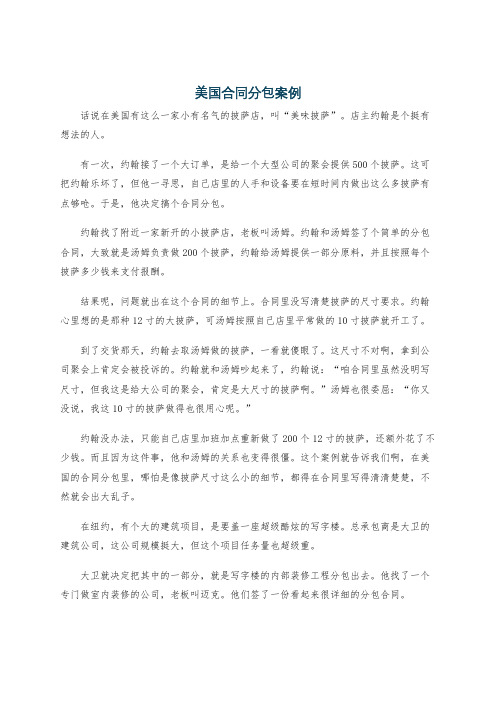
美国合同分包案例话说在美国有这么一家小有名气的披萨店,叫“美味披萨”。
店主约翰是个挺有想法的人。
有一次,约翰接了一个大订单,是给一个大型公司的聚会提供500个披萨。
这可把约翰乐坏了,但他一寻思,自己店里的人手和设备要在短时间内做出这么多披萨有点够呛。
于是,他决定搞个合同分包。
约翰找了附近一家新开的小披萨店,老板叫汤姆。
约翰和汤姆签了个简单的分包合同,大致就是汤姆负责做200个披萨,约翰给汤姆提供一部分原料,并且按照每个披萨多少钱来支付报酬。
结果呢,问题就出在这个合同的细节上。
合同里没写清楚披萨的尺寸要求。
约翰心里想的是那种12寸的大披萨,可汤姆按照自己店里平常做的10寸披萨就开工了。
到了交货那天,约翰去取汤姆做的披萨,一看就傻眼了。
这尺寸不对啊,拿到公司聚会上肯定会被投诉的。
约翰就和汤姆吵起来了,约翰说:“咱合同里虽然没明写尺寸,但我这是给大公司的聚会,肯定是大尺寸的披萨啊。
”汤姆也很委屈:“你又没说,我这10寸的披萨做得也很用心呢。
”约翰没办法,只能自己店里加班加点重新做了200个12寸的披萨,还额外花了不少钱。
而且因为这件事,他和汤姆的关系也变得很僵。
这个案例就告诉我们啊,在美国的合同分包里,哪怕是像披萨尺寸这么小的细节,都得在合同里写得清清楚楚,不然就会出大乱子。
在纽约,有个大的建筑项目,是要盖一座超级酷炫的写字楼。
总承包商是大卫的建筑公司,这公司规模挺大,但这个项目任务量也超级重。
大卫就决定把其中的一部分,就是写字楼的内部装修工程分包出去。
他找了一个专门做室内装修的公司,老板叫迈克。
他们签了一份看起来很详细的分包合同。
合同里规定了装修的风格是现代简约风,要用特定品牌的装修材料,还规定了工期。
迈克的团队就开始干起来了。
可是呢,在施工过程中,遇到了一个大问题。
这个城市突然出台了一个新的建筑环保规定,要求在装修过程中使用的某些材料必须达到更高的环保标准。
大卫觉得这是迈克应该解决的问题,因为是他负责装修嘛。
- 1、下载文档前请自行甄别文档内容的完整性,平台不提供额外的编辑、内容补充、找答案等附加服务。
- 2、"仅部分预览"的文档,不可在线预览部分如存在完整性等问题,可反馈申请退款(可完整预览的文档不适用该条件!)。
- 3、如文档侵犯您的权益,请联系客服反馈,我们会尽快为您处理(人工客服工作时间:9:00-18:30)。
The implication of such a promise can find supports in many circumstances.
• 1. The acceptance of the exclusive agency meant that Wood had accepted the duties of that agency. • 2. The P’s business organization will be used for the purpose for which it is adapted. • 3. Because Lady Duff-Gordon’s sole compensation was a split of the profits, there would be no efficacy功效, 效力to the transaction unless there was an implied promise to use best efforts. • 4. The P’s promise to give one-half of the profits and revenues resulting from the exclusive agency and to render accounts monthly was a promise to use reasonable efforts to bring profits and revenues in to existence.
D
the exclusive right half of all revenues
P
Facts
• Wood's only duties under the contract were to account for monies received and secure patents as necessary, but if Wood did not work to market the clothes, no monies would be received and no patents would become necessary. • Around the same time, Duff-Gordon came up with an idea to market a line of clothing "for the masses" and broke the purported agreement by endorsing products sold by Sears Roebuck and Wood sued.
• A promise maybe lacking, and yet the whole writing may be “instinct with an obligation,” imperfectly expressed.
Reasons
• The court held that it was clear from the terms and recitals and duties under the contract that both parties intended to do what was reasonably necessary to make it a success so that would be profits to divide.
Facts
• Lady Duff-Gordon signed a contract with Wood giving him the exclusive right to market garments and other products bearing her endorsement for one year beginning on April 1, 1915. (and thereafter from year to year unless terminated by notice of 90 days)This contract gave Lucy Duff Gordon half of all revenues thus derived.
• Although the P did not promise in words that he will place the D’s endorsement and market the D’s products, his promise actually can be implied from his using reasonable efforts to do so.
Facts
• The defendant,
• Lucy, Lady Duff-Gordon, styled herself as “the creator of fashion”, was a leading designer of fashions for high society.(her couture服装设计label known as "Lucile", was a leading designer of fashions for high society as well as the stage and early silent cinema无声电影, and was a survivor of the 1912 sinking of the RMS Titanic. ) The things which she designed, or other things like fabrics, parasols were of high value in the public’s mind when issued in her name.
Facts
• The trial court denied Lady DuffGordon’s motion for a judgment on the pleadings and found for Wood. • The intermediate appellate court reversed the trial court’s judgement on the grounds that the contract lacked mutuality because Wood never expressly promised to do anything. • Wood then appealed to the Court of Appeals of New York.
Holding anes
Reasons
• The law has outgrown革除或放弃 its primitive stage of formality when the precise word was the sovereign talisman法宝 . It takes a broader view today.
Wood v. Lucy, Lady Duff-Gordon
222 N.Y. 88, 118 N.E. 214 (1917).
Facts
• The plaintiff, Otis F. Wood, was a top New York advertising agent whose clients included major commercial clients as well as celebrities.
Issues
• 1) May a promise to use reasonable efforts be implied from the entire circumstances of a contract?
• 2) Can an implied promise to use best efforts be considered valuable consideration? • 3) Can the duty of good faith compensate for vagueness in an agreement to avoid invalidation of a contract clearly intended by the parties?
Facts
• The plaintiff insisted that the defendant placed endorsements on clothes without his knowledge and in violation of the contract.
Facts
• The defendant defended on the grounds that no valid contract existed and therefore since the P had not made an express promise to do anything, the D contended that the agreement was invalid and could not be enforced for lack of consideration.
Disposition
• The judge of the Allelliate Division be reversed.
Conclusion
• This case is an example of the court imposing a duty of good faith on a party to perform an implied promise. Cardozo dispensed with formalism to enforce a promise that was implied when viewed in the context of numerous aspects of the agreement. An implied promise is sufficient to constitute consideration.
